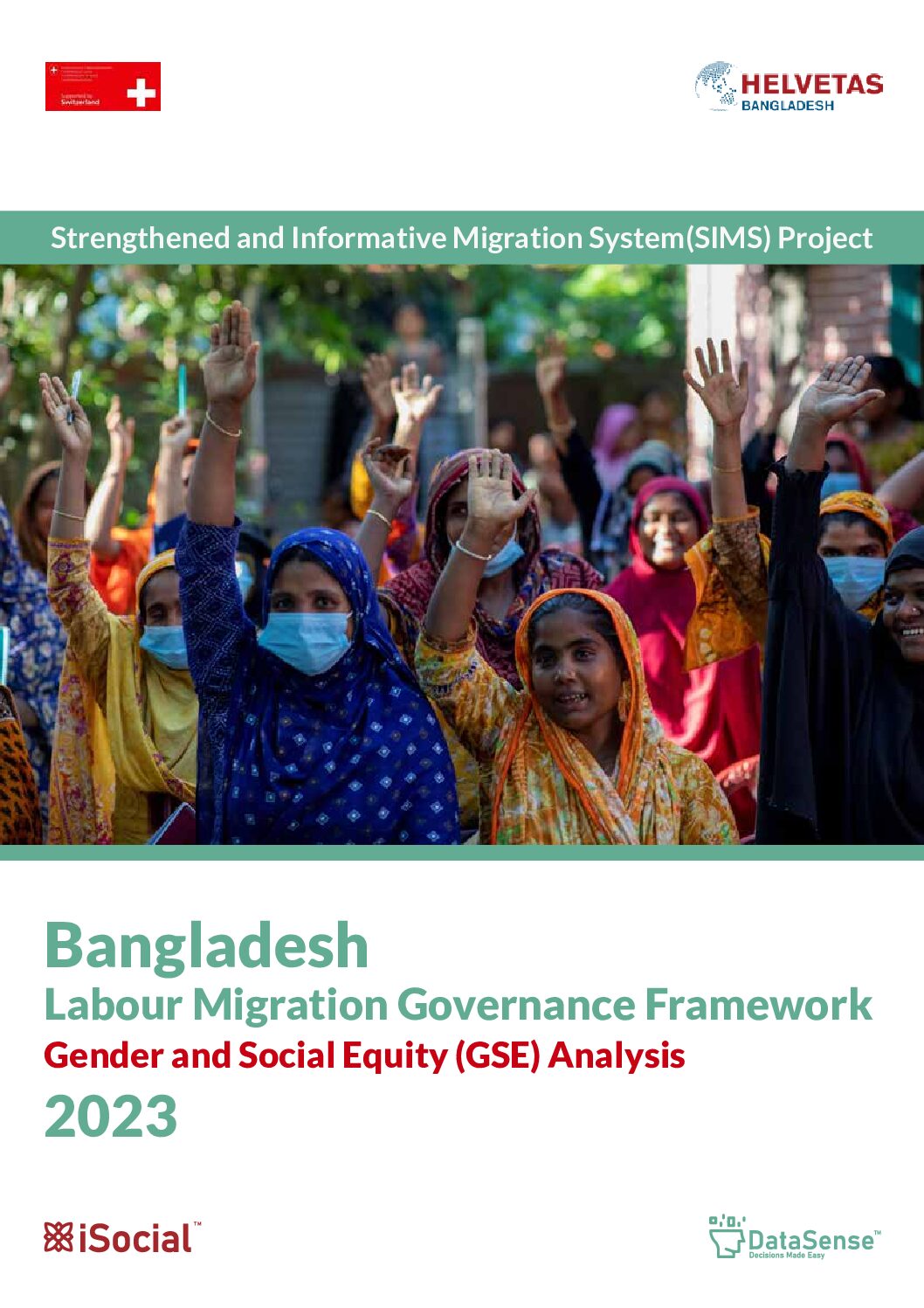Assessing the migration framework of Bangladesh apply the lens of gender and social equity
Project timeline: February – March, 2023
Partners:
Swiss Agency for Development and Corporation
Helvetas Bangladesh
Project objective:
Analyze the gender gaps within Bangladesh’s legal and institutional frameworks governing labor migration. This analysis aimed to identify specific shortcomings that fail to address the unique needs, interests, services, protection, safety, and rights of women migrant workers. The ultimate goal was to inform and engage relevant stakeholders to drive transformative changes that improve the lives and well-being of women migrant workers and their families.
Project outcome:
Identified Gender Gaps in Migration Governance: The project successfully identified and detailed gender gaps within the legal framework (e.g., Overseas Employment and Migrants Act 2013, management rules) and institutional mechanisms of Bangladesh’s labor migration governance.
Analyzed Women’s Migration Journey Challenges: It systematically documented the 14 stages of a woman migrant worker’s journey, from decision-making to reintegration, highlighting specific challenges and risks faced at each step.
Highlighted Push Factors for Women’s Migration: The study confirmed that push factors (e.g., marital strife, abuse, economic vulnerability) play a more significant role for women migrant workers than pull factors, often leading to precarious migration.
Exposed Exploitative Recruitment Practices: The project revealed widespread issues with contract transparency, with many women receiving contracts only at departure or even after boarding their flight.
Documented Abuse and Lack of Protection: It presented evidence of restrictions on communication and mobility, verbal, physical, and sexual abuse, and a high incidence of women escaping employers’ homes due to mistreatment.
Uncovered Neglect of Women’s Unique Needs: The report highlighted the systemic disregard for women’s reproductive health, emotional vulnerability, access to healthcare and finance, and childcare needs in employment contracts and support systems.
Revealed Reliance on Informal Intermediaries: The study found a pervasive reliance of women migrants on informal intermediaries due to lack of information, leading to vulnerability, exploitation, and financial losses.
Detailed Institutional Shortcomings: It identified critical gaps in institutional mechanisms, such as the absence of women’s labor wings in destination countries, ineffectiveness of Probashi Kallyan Bank, and inadequate quality of pre-departure training.
Proposed a Transformative Agenda: The project developed a comprehensive agenda with specific enabling measures for improving the legal and institutional frameworks, including policy updates, data collection, bilateral agreements, awareness campaigns, financial literacy programs, and dedicated women’s labor wings.
Locations the project served: Nationwide – The analysis focuses on the country’s national legal and institutional frameworks governing labor migration and addresses issues relevant to women migrant workers from Bangladesh, primarily those going to Middle Eastern countries.
Project Impact:
Informed Policy and Legal Reforms: The detailed analysis and recommendations provide a strong basis for the Government of Bangladesh to update and harmonize existing policies (e.g., EWOEP 2016) and legal instruments (e.g., OEMA 2013) to be more gender-sensitive and legally binding.
Improved Protection and Safety for Women Migrants: By identifying specific vulnerabilities and proposing measures like gender-responsive bilateral agreements and women’s labor wings, the project aims to enhance the safety and protection of women workers abroad.
Enhanced Service Delivery: The recommendations for improving information dissemination, financial literacy, access to credit, and specialized healthcare services for women migrant workers could lead to more tailored and effective support.
Greater Accountability for Recruitment Agents: The proposed updates to recruitment agent rules, including gender-sensitive grading criteria and accountability for women’s safety, could reduce exploitation during the recruitment process.
Strengthened Institutional Mechanisms: The project’s findings advocate for crucial improvements in governmental and financial institutions (e.g., PKB, WEWB) to better serve the needs of women migrants and their families.
Increased Awareness and Advocacy: By shedding light on the often-hidden precarities faced by women, the report serves as a powerful tool for civil society organizations and development partners to advocate for the rights and welfare of women migrant workers.
Potential for Dignified Reintegration: The emphasis on formal reintegration programs and addressing stigma for returning women migrants could lead to better social and economic outcomes for them.
Identified Gaps in Legal Framework by GSE Pillar:
Gender Roles & Division of Labour: Legal instruments like the OEMA 2013 and recruitment rules fail to address the highly gendered nature of women’s labor migration (predominantly domestic work) and do not encourage diverse employment opportunities for women.
Access to and Control Over Services and Resources: The OEMA 2013 lacks provisions for financial facilities for women migrants, and the Overseas Migrants Insurance Policy 2019 offers no health or maternity coverage, nor does it cover children left behind. Recruitment agent rules do not demand accountability for ensuring women’s health or safe employment.
Participation, Voice, and Decision Making: The OEMA 2013 is largely gender-blind in its definition of migrant worker rights, omitting women-specific needs. Key decision-making bodies like the Wage Earners Welfare Board’s Executive Committee are male-dominated with minimal representation from women migrants or civil society organizations.
Women’s Needs and Interests: Policies and rules generally lack specific provisions for women’s unique needs, such as reproductive health rights, mental and physical safety at the workplace, and adequate support during crisis. Even “gender-sensitive” policies like EWOEP 2016 show poor implementation of initiatives like dedicated women’s labor wings or specific provisions for safe remittance banking.
Cultural Norms and Beliefs: Existing legal frameworks offer no explicit provisions or support mechanisms to address the social stigma and hostility faced by women migrants upon return or the trauma experienced by children left behind due to the mother’s migration.

